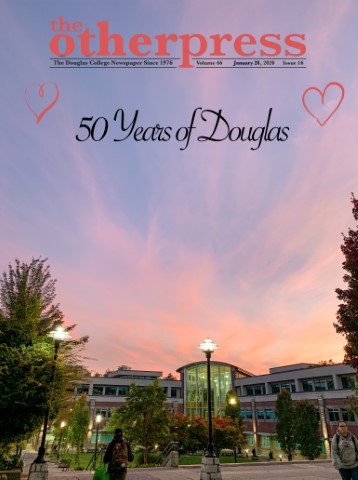
Looking back on the college’s history and the community school stigma
By Jessica Berget, Editor-in-Chief
Better to be over the hill than under it as they say. As we celebrate Douglas College turning 50 this year, we can finally say it’s over the hill—literally and figuratively.
Being a student here for a couple years, I never gave much thought to this community college. To be honest, I only came here because most of my friends at the time were here. But, as we celebrate the half of a century milestone with this little institution we call our school, I think now is as good a time as any to look back on the place many of us come to receive our education.
Douglas, a history
The colleges namesake begins with Sir James Douglas, a Canadian politician and fur-trader who became the first governor of the colony of BC. He got his nickname of “The Father of British Columbia,” but I guess now we can call him “Big Daddy Douglas.” Almost 100 years after his retirement, Douglas College was opened and named in his memory. According to the Douglas College homepage, the choice to name the school after Douglas is “an embodiment of the highly diverse, endlessly fluctuating, frequently unjust imperial world of which he was a product, and to which he made important contributions.”
Give it the ol’ college try
It may be hard to believe now, but Douglas College had a rough go when it first opened in November of 1970. Classes were pushed until October and November because of construction and budget cuts. Because of the lack of space, classes took place in twenty different community centres, church basements, warehouses, and secondary schools. Students and faculty had to rush to each location for their next classes. Now, we can enjoy the luxury of classes at being as far as the Anvil centre.
On November 19, Douglas officially opens with 1,200 full-time students, over 700 part-time students, and 95 faculty. Tuition started at $100 a semester (wouldn’t that be nice)? Fifty years later, $100 might get you a textbook and the average price of a class is about $500. There are also over 25,000 students and over 1,800 staff, faculty, and assistants employed at the college according to the 2017 to 2018 Douglas College quick facts, growing it into one of the largest post-secondary institutions in BC.
Plans for a permanent campus were discussed in 1972, and a recently elected NDP government in BC agreed to pay all costs to build three permanent campuses. Douglas was also one of the first colleges in BC to offer women’s and environmental studies classes.
In 1977, as student enrolment rises, classes were held in New Westminster, Surrey, and Richmond and the school found ways to accommodate the growing number of students. After years of campus relocations and ballooning enrollment, the BC government approved $1.9 million plan to make a permanent campus location in New Westminster.
After many years of constructions, splitting of campuses, and relocations—finally, in 1982, Douglas found its permanent home on Royal Avenue and settled into their new location and years later in 1996, opened the second location in Coquitlam named after David Lam, a Hong Kong born Canadian politician and twenty-fifth Lieutenant-Governor of BC.
Stigmas against community colleges
As a student at Douglas, I’ve heard all the negative connotations that come with going to a smaller sized community college rather than a research university, but I don’t believe any basis for this stigma other than pure elitism. Yet, there are arguments made that going to a smaller sized community college is cheaper, smaller in terms of scale or student population, and therefore is less quality education—or that community college students are lazy or not as passionate and motivated as university students. Considering the fact that Douglas College is the largest degree granting college in BC, and offers the most Bachelor’s degrees and post-degree programs than any college in BC, I fail to see the truth in that. So, why does this stereotype persist?
It may be a small school when compared to other Canadian research universities like SFU or UBC, but that’s no justification for the negative connotation behind going to a smaller school. In fact, going to smaller school has some major perks that no one mentions. For one thing, first year classes in universities can be as packed as 500 to 800 students are in a single class. The same classes at Douglas are taught with about 35 students—meaning every student gets more hands-on experience and attention from their professors. Besides also being generally cheaper than a university, colleges like Douglas are made for students who need to balance work and other responsibilities—the college allows students to have very flexible scheduling to accommodate. Douglas also combines the foundation of academia like a university with the career-ready experience and skills of a college.
Douglas is also popular with students and faculty as far as satisfaction rates. In a BC stats survey compiling data from 2015 to 2018, an average of 93 percent of students at Douglas were satisfied with their education. Douglas was also recognized as BC’s best employers in 2019, citing its accommodations for employees who are also parents, their initiatives for mental and physical well-being, the encouragement they give their employees to continue their education, as well as offering a variety of training programs.
We only know Douglas as the place where we come and learn, but I think it’s important to recognize the rich and fascinating history that accompanies it. The very halls and concourse we walk through is the same one that many other passionate and dedicated students have walked through years ago… and will continue to walk through for many more years to come. Here’s to another fifty years, Dougie.


